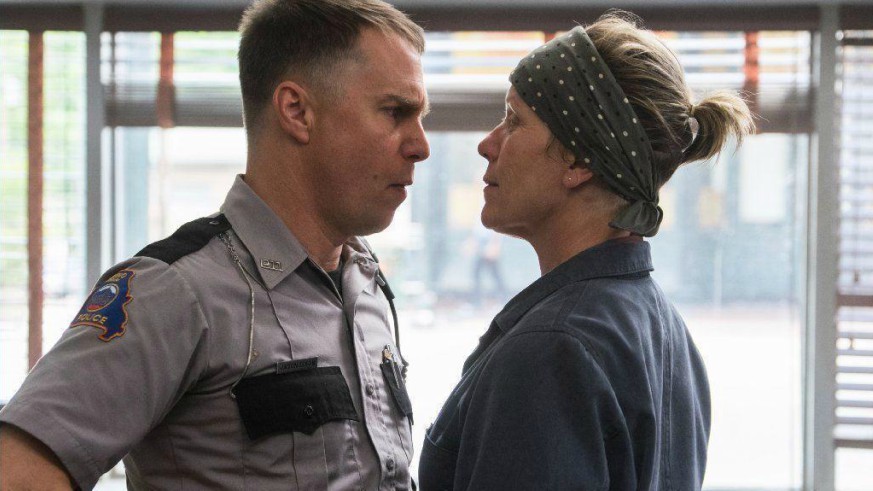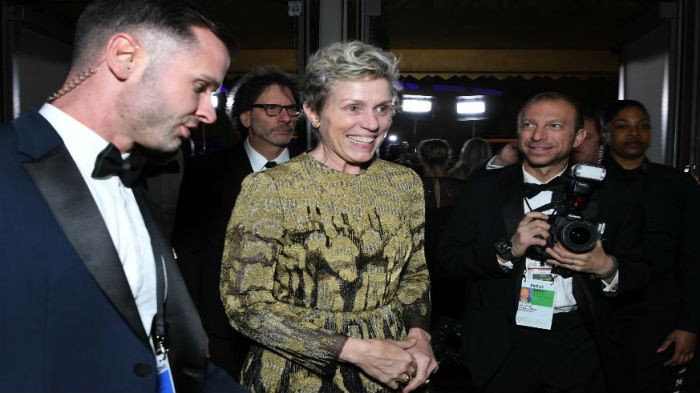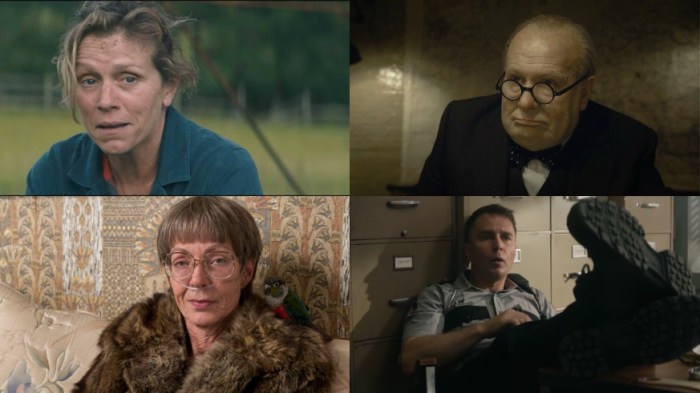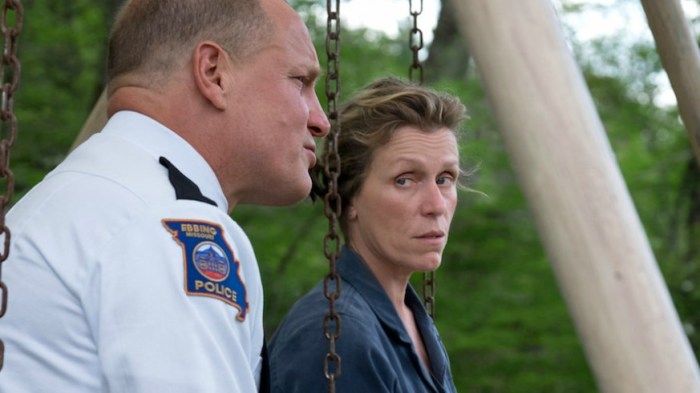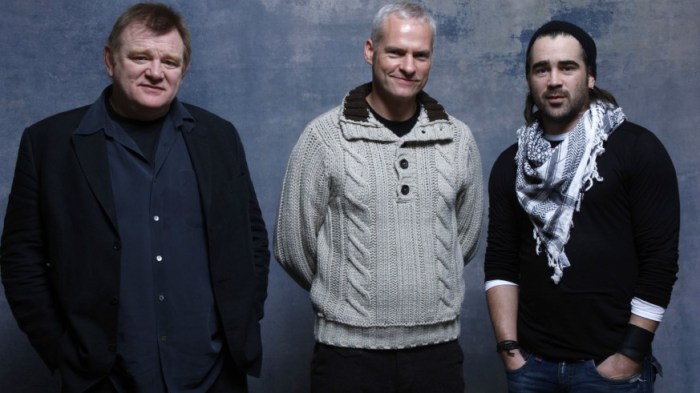Warning: The following contains huge SPOILERS for Three Billboards Outside Ebbing, Missouri, as that’s the only way that you can discuss the controversy that is threatening to overshadow its awards season success.
Ahead of its release no-one really saw the backlash against “Three Billboards Outside Ebbing, Missouri” coming.
Beforehand, all we knew was that it was written and directed by acclaimed playwright Martin McDonagh, whose debut film “In Bruges” was highly regarded, marked the return of Frances McDormand after a prolonged big-screen absence, and more than likely revolved a trio of billboards outside of a fictitious town in the Midwest.
After its debut at the Venice International Film Festival, and its success at the Toronto International Film Festival, where it won the top prize of the People’s Choice Award, most critics quickly lavished praise upon the film for the dark humor of McDonagh’s script, the performances of Sam Rockwell and McDormand, and how it handled the inherent rage of its grieving main character.
It was also then that the first murmurings of criticism towards “Three Billboards Outside Ebbing, Missouri” emerged. This has only grown louder with its wide release and its success at the Golden Globes, Critics Choice, and Screen Actors Guild awards ceremonies. By the time of the Oscars, where it is expected to be a frontrunner, you can expect the discontent to be vociferous.
But what are the issues with “Three Billboards Outside Ebbing, Missouri”?
Writing in The Daily Beast, Ira Madison III called Three Billboards “tone-deaf,” “manipulative,” and “altogether offensive,” especially for the manner in which it redeems Sam Rockwell’s Officer Jason Dixon, a racist police officer that ultimately gets beaten to a pulp in order to get the DNA of a potential suspect in the death of Angela Hayes.
Just last week, Wesley Morris also said of “Three Billboards” in The New York Times, “It’s one of those movies that really do think they’re saying something profound about human nature and injustice,” before criticizing the film and McDonagh for poking but never deeply probing themes of racism and “America’s ills.”
A quick scan on Twitter presents numerous other arguments against the success of “Three Billboards Outside Ebbing, Missouri.”
None of them are wrong. We all take in movies in our own subjective fashion. Where we were born, how we were raised, and even how we slept the night before all contribute to the manner in which we digest them. As does the political and social climate into which they are released.
That’s why critics and audiences are mostly in agreement about the magnitude of Frances McDormand’s titanic performance as Mildred Hayes, who takes matters into her own hands as “Three Billboards” unfolds, something that feels particularly potent because of the #MeToo and Time’s Up movements.
At the same time, though, it just doesn’t feel right to see a racist police officer being given an inch of redemption considering the rise of Donald Trump, his racist rhetoric, and the police brutality that has resulted in so many unnecessary deaths of African Americans. But it not feeling right or making for comfortable viewing doesn’t diminish the film.
Especially because, for me, “Three Billboards Outside Ebbing, Missouri” doesn’t try to say anything “profound” about racism or present a clean cut version of racists. Throughout the film is messy and complex, and, at is heart and come its conclusion, unsatisfactory. Its characters are just the same, something that McDonagh told me himself when I sat down with the writer and director back in November.
“So many crimes are unsolved, and part of the story is what happens when crime isn’t solved. What happens to the people left behind? What happens to their anger and rage and pain? So tying it up with a bow and finding the culprit became less interesting to me because that is not how life works all of the time. There is something much sadder going on in life sometime.”
On the blurring of the characters, and why Mildred becomes less sympathetic while Dixon becomes more, McDonagh also remarked, “This isn’t a simple heroic female lead. Because she is not heroic in a bunch of places. But that’s much more rounded and exciting anyway. You can’t defend kicking kids in the balls, but it is funny and exciting. A male character in that role you wouldn’t want to get away with it, but there is something hilarious about her doing it.”
“That’s part of the fun of the whole piece. You think you’re on her side, and we are on her side, but then … and then we think we’re completely against Sam and then there’s a change and that happens at the same time so it takes us to new places. And that’s what is kind of exciting.”
“And that’s what people have taken from it. Firstly, people think it is all her film, and it is not exactly. And secondly you think you are on safe ground about who is the hero and who is the villain and you are not really. And that’s more hopeful than a simple black and white hero and villain story.”
When it comes to Dixon, the character only starts to arc after reading Chief Willoughby (Woody Harrelson)’s posthumous letter to him, which is seemingly the only time in his life when he has been given positive reinforcement and is told that he is a nice guy. The previous scenes between Dixon and his mother show that he was born and raised in a hostile, hate-filled, and racist environment, and as a result he has become a loathsome individual.
Dixon’s mutation continues when he shares a hospital room with Red Welby (Caleb Landry Jones), the innocent billboard salesman who rented the titular advertisements to Mildred. This provoked the ire of Dixon, who, in the wake of Willoughby’s death, pummels Red close to death. When Red learns that the severely bandaged Dixon, who was injured in the police station fire started by Mildred, is the one barely conscious next to him in the hospital, rather than seeking revenge, he just gives him a sip of orange juice.
Sure, it is a very, very simple moment. But the peace offering is still enough to convince you that Dixon has now seen the potential to do good. It’s not even that he then goes out and starts to look for Angela Hayes’ killer, too. Instead a potential culprit just sidles up to the bar booth next to him and starts gloating about being a murderer, mentioning details that make it appear as though he committed the heinous crime. The redemption comes to him, he just takes it.
But even then it’s not as though “Three Billboards” ends in a positive fashion. The final scene, which shows Mildred and Dixon coldly driving to an inevitable violent future in Idaho, where they plan to kill a rapist and killer that neither know, festers with a depressed resignation.
Rather than suggesting that it has a solution to the problems festering in the USA, “Three Billboards” is instead a film that looks back and examines what creates such hatred, the need for violence and how it spirals out of control.
Before ultimately reminding us that we are all in this journey together, and warning that being consumed by such fear and hatred can completely incapacitate us.
It’s harsh. It’s complex. It’s even unsatisfactory. Which is exactly what makes it so American.

